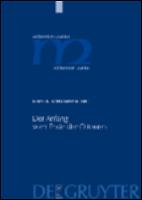Der Anfang vom Ende der Ottonen
Konstitutionsbedingungen historiographischer Nachrichten in der Chronik Thietmars von Merseburg
| dc.contributor.author | Schulmeyer-Ahl, Kerstin | |
| dc.date.accessioned | 2021-12-07T16:15:36Z | |
| dc.date.available | 2021-12-07T16:15:36Z | |
| dc.date.issued | 2009 | |
| dc.identifier | ONIX_20211207_9783110214000_42 | |
| dc.identifier | OCN: 624675369 | |
| dc.identifier.issn | 1862-1139 | |
| dc.identifier.uri | https://library.oapen.org/handle/20.500.12657/51687 | |
| dc.language | German | |
| dc.relation.ispartofseries | Millennium-Studien / Millennium Studies | |
| dc.subject.classification | thema EDItEUR::N History and Archaeology::NH History::NHC Ancient history | en_US |
| dc.subject.classification | thema EDItEUR::N History and Archaeology | en_US |
| dc.subject.classification | thema EDItEUR::3 Time period qualifiers::3K CE period up to c 1500 | en_US |
| dc.subject.other | Chronicle | |
| dc.subject.other | Ottonian | |
| dc.subject.other | Thietmar of Merseburg | |
| dc.title | Der Anfang vom Ende der Ottonen | |
| dc.title.alternative | Konstitutionsbedingungen historiographischer Nachrichten in der Chronik Thietmars von Merseburg | |
| dc.type | book | |
| oapen.abstract.otherlanguage | In the Chronicle of Thietmar of Merseburg, the experiences and problems of the tenth and early eleventh centuries come together they are taken up by Thietmar and formed into an epoch. This overall interpretation of the chronicle by the Bishop of Merseburg sees historical knowledge as a consistent product of a dynamic process, as an interplay of cultural and cognitive factors in a particular historical situation. On the basis of this dynamic concept of knowledge, it is possible to present a new interpretation of central episodes of Ottonian historiography and at the same time to demonstrate the future potential of images from the past. | |
| oapen.identifier.doi | 10.1515/9783110214000 | |
| oapen.relation.isPublishedBy | 2b386f62-fc18-4108-bcf1-ade3ed4cf2f3 | |
| oapen.relation.isbn | 9783110214000 | |
| oapen.relation.isbn | 9783110191004 | |
| oapen.series.number | 26 | |
| oapen.pages | 463 | |
| oapen.place.publication | Berlin/Boston |

